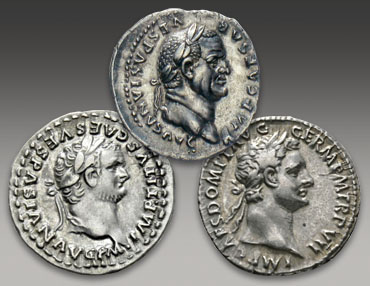
Vespasian silver denarius
Titus silver denarius
Domitian silver denarius
Rome, Italy
69~96 A.D.
Most of what we know of the first twelve Caesars of Rome came from the writings of Roman historian Suetonius. He wrote histories of the Emperors, beginning with Julius Caesar and continuing through Augustus, Tiberius, Caligula, Claudius, Nero, Galba, Otho, Vitellius, Vespasian, Titus, and Domitian. He was born in 69 AD, around the time of Vitellius so his writings drew largely from the Imperial Archives and other written sources, along with his own bias and that which was dictated to him.
The Flavian Dynasty was made up of the father, Vespasian followed by each of his two sons, Titus and Domitian.
Vespasian ruled from 69 AD to 79 AD. He was known for being witty and kind-hearted with a commanding nature. During his reign, he began the construction of the Colosseum, then known as the Flavian Amphitheater among other beautification projects. Little is known of his rule during his ten years in power. Sadly, he died of dysentery at the age of 69.

Titus became emperor of Rome upon his father’s death in 79 AD. Under his father’s rule, Titus was renowned for ending the First Jewish Rebellion with the destruction of Jerusalem in 70 AD. During his own reign, he finished the Colosseum his father started. Titus was extremely generous and helpful to those affected by the eruption of Vesuvius and the destruction of Pompeii and Herculaneum. He was the same with the following year’s Fire of Rome and the plague that struck shortly afterwards. In 81 AD, only two years into his reign, Titus fell ill of a fever and died.
He was so well liked that Suetonius considered him the best of the Twelve Caesars. The Jews, however, nicknamed him ‘Titus the Wicked’ for his ruthless treatment of Jerusalem.
Domitian, Titus’ younger brother followed as emperor. He ruled from 81 AD to 96 AD as an authoritarian, significantly reducing the power of the Senate. He became the moral authority to the people of Rome, much to the Senate’s dislike. Domitian rebuilt much of Rome from the affects of the fire, strengthened Rome’s borders, and revalued the coinage of Rome to improve the economy. His later authoritarian impulses became a ‘Reign of Terror’ against perceived corruption, to the point of having family members executed. In 96 AD, Domitian was assassinated by court officials. The Senate declared him a damned persona, destroyed his temples, melted his statues and coins, and removed his name from public records.
The Flavian Dynasty was unusual, in that the Caesarian reign fell from father-to-son-to-son, with no other family or adopted members involved.
The three silver denarii acquired by the museum were purchased from three ancient coin dealers in Rome and Great Britain.